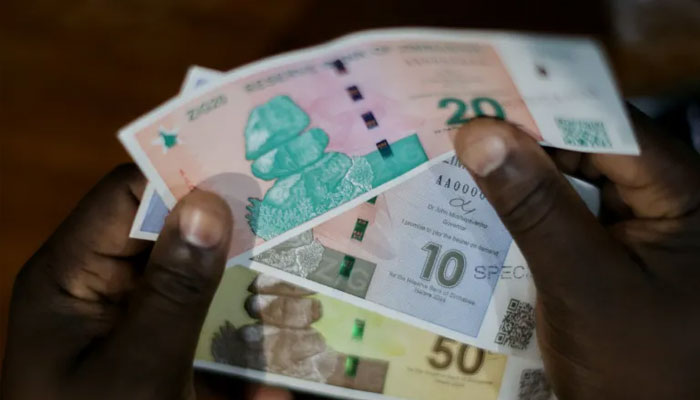Zimbabwe launches ‘gold-backed’ currency to replace collapsing dollar
ZiG, which stands for Zimbabwe Gold, will have an initial value of 13.56 to the US dollar
London/Johannesburg: Zimbabwe has replaced its collapsed local dollar with a new gold-backed currency, the latest move by President Emmerson Mnangagwa’s government to tackle decades of monetary chaos.
John Mushayavanhu, governor of the southern African nation’s central bank, admitted on Friday that money printing had wrecked the five-year-old Zimbabwe dollar as he launched the ZiG, its replacement.
The ZiG, which stands for Zimbabwe Gold, will have an initial value of 13.56 to the US dollar, Mushayavanhu said, after the former currency lost over three-quarters of its value this year alone to trade at Z$36,000 to the dollar.
“We want a solid and stable national currency . . . it does not help to print money,” he added, reflecting a long history of Zimbabwe’s ruling Zanu-PF using inflationary financing to pay for spending and reward allies.
The new currency “shall be anchored in and backed or covered by a composite basket of foreign currency reserves and precious metals received [mainly gold] and valuable minerals”, according to a ruling Mnangagwa’s government issued on Friday to enforce the new money.
The Reserve Bank of Zimbabwe has just over one tonne in gold in its own vaults and 1.5 tonnes held offshore, along with a smattering of other foreign currency reserves.There are doubts from economists that these reserves will be enough to support a new currency, especially given a widespread lack of trust from ordinary Zimbabweans who have seen purchasing power and savings wiped out by years of turmoil.
So many Zimbabweans prefer to keep their money at home that the practice has gained an affectionate nickname: “mattress banking”.“We’ve had five currencies over the past 10 years,” said Masimba Manyanya, a former chief economist in the finance ministry. “It reflects confusion within government itself.”
Benson Gandiwa, who runs a grocery shop in the capital Harare, said he had not used the local currency in years and had no plans to change that. “My business is alive because I stick to the US dollar,” he said.
Zimbabwe’s foreign exchange reserves remain far below those of many African economies, equating to barely one month of import cover. In Kenya, which recently averted a looming currency crisis, the central bank’s reserves have recovered to more than $7bn, or 3.7 months of import cover.
“Zimbabwe has less than a month of reserves, not enough to defend the structured currency,” said economist Tinashe Murapata. “A new currency every five years now seems the norm.”Zimbabwe cannot rebuild reserves without access to international markets and multilateral support, which has been cut off by decades of arrears to official lenders on much of its external debt. Mnangagwa made new overtures to end the financial isolation and clear the debt after taking power from Robert Mugabe in a 2017 coup.
But repeated bouts of repression by his security forces over the years have made the US and other governments less willing to engage.This year the US suspended its involvement in a dialogue on the debt over the running of elections in 2023, which were widely seen as rigged in order to re-elect Mnangagwa to a second term.
Mnangagwa this week declared a state of disaster over a severe regional drought that has destroyed much of this year’s harvest, and said that more than $2bn would be needed to finance the emergency response.
-
 Bad Bunny Stunned Jennifer Grey So Much She Named Dog After Him
Bad Bunny Stunned Jennifer Grey So Much She Named Dog After Him -
 Kim Kardashian's Plans With Lewis Hamilton After Super Bowl Meet-up
Kim Kardashian's Plans With Lewis Hamilton After Super Bowl Meet-up -
 Prince William Traumatised By ‘bizarre Image’ Uncle Andrew Has Brought For Royals
Prince William Traumatised By ‘bizarre Image’ Uncle Andrew Has Brought For Royals -
 David Thewlis Gets Candid About Remus Lupin Fans In 'Harry Potter'
David Thewlis Gets Candid About Remus Lupin Fans In 'Harry Potter' -
 Cardi B And Stefon Diggs Spark Breakup Rumours After Super Bowl LX
Cardi B And Stefon Diggs Spark Breakup Rumours After Super Bowl LX -
 Alix Earle And Tom Brady’s Relationship Status Revealed After Cosy Super Bowl 2026 Outing
Alix Earle And Tom Brady’s Relationship Status Revealed After Cosy Super Bowl 2026 Outing -
 Why King Charles Has ‘no Choice’ Over Andrew Problem
Why King Charles Has ‘no Choice’ Over Andrew Problem -
 Shamed Andrew Wants ‘grand Coffin’ Despite Tainting Nation
Shamed Andrew Wants ‘grand Coffin’ Despite Tainting Nation -
 Keke Palmer Reveals How Motherhood Prepared Her For 'The Burbs' Role
Keke Palmer Reveals How Motherhood Prepared Her For 'The Burbs' Role -
 King Charles Charms Crowds During Lancashire Tour
King Charles Charms Crowds During Lancashire Tour -
 ‘Disgraced’ Andrew Still Has Power To Shake King Charles’ Reign: Expert
‘Disgraced’ Andrew Still Has Power To Shake King Charles’ Reign: Expert -
 Why Prince William Ground Breaking Saudi Tour Is Important
Why Prince William Ground Breaking Saudi Tour Is Important -
 AOC Blasts Jake Paul Over Bad Bunny Slight: 'He Makes You Look Small'
AOC Blasts Jake Paul Over Bad Bunny Slight: 'He Makes You Look Small' -
 At Least 53 Dead After Migrant Boat Capsizes Off Libya
At Least 53 Dead After Migrant Boat Capsizes Off Libya -
 'God Of War' Announces Casting Major Key Role In Prime Video Show
'God Of War' Announces Casting Major Key Role In Prime Video Show -
 Real Reason Prince William, Kate Broke Silence On Andrew Scandal Revealed
Real Reason Prince William, Kate Broke Silence On Andrew Scandal Revealed




